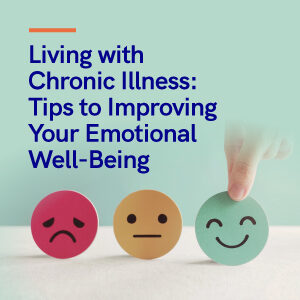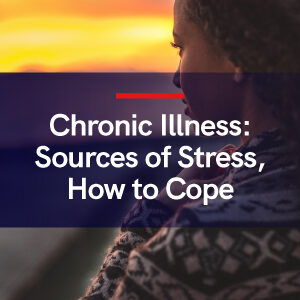With the COVID-19 pandemic, we are in unique and strange times. We are being challenged in ways many of us have never experienced before. On one hand, if you are reading this on the Sanguine Blog, you’ve likely had plenty of practice at resilience and managing change. After all, illness is anything but consistent. On the other hand, maintaining relationships and wellness when living with a diagnosis usually requires just the right balance of support and independence, routine and flexibility. With the COVID-19 pandemic, that balance has been significantly undermined for most people. In this blog, I focus on caregivers and family relationships and how to stay focused on wellness despite the new stressors this may bring up. Read our previous blog about how to maintain wellness during this time!
We all cherish our caregivers and loved ones; we know how heroic these individuals are. But that doesn’t mean we always get along perfectly! If there were family tensions before being in lockdown, they’re bound to increase now. And if there weren’t any before, you might notice some new issues popping up. As everyone keeps saying, “we’re all in this together” and you might, in fact, be physically “together” more than you had ever anticipated. Even the average healthy person is having a tough time being in such close quarters with loved ones 24/7. But if you are relying on someone for help, the relationship and your emotional health could get tricky!
One of my college professors taught me something profound about how to maintain relationships. Relationships are multiplication, NOT addition. It isn’t that two halves make a whole. When you multiply two halves, you get a quarter. Healthy relationships depend on each person showing up as their best, which means you need to take extra steps for you and your loved ones to maintain relationships while at home together. Additional tension and frustration is natural when spending this much time in close quarters with the same people. Here are some things to consider and ways you can reduce the tension to keep relationships intact.
Communication
It’s important when we’re in new circumstances to actually over-communicate. This might not come naturally and may seem counter-intuitive, but it’s important to make the extra effort in order to prevent misunderstandings that can lead to potential arguments.
Tip: After expressing yourself or asking for something you might need, just ask the other person to reflect back to you what they heard. Do the same when they express themselves and reflect back to them what you heard. Make sure you actually understood each other.
Upgraded Self Care
We all need an upgraded self-care routine during this stressful time in order to maintain relationships with others. It’s important to be open to the idea that what used to feel nourishing before might not be enough right now. We all need to develop more robust self care routines. You may not even know what you need, which can make it hard for others to support you, and vice versa. It’s important to show up for yourself and explore other avenues so that any additional stress during this time is not impacting your health or your relationships. Your loved one’s wellness impacts the energy in the house as well, so suggest they also increase their self care during this time.
Tip: Integrate one or more of the below with your self care regimen:
- Use aromatherapy with essential oils
- Read or listen to an inspiring book or podcast*
- Reduce news consumption**
- Learn or increase your meditation practice (Apps like InsightTimer and Headspace are useful)
- Practice guided breathing techniques that you can find on YouTube
Awareness of Your Loved Ones
Illness or the ‘patient,’ is often the focus of attention in a family unit. Our worries and anxieties all seem to get concentrated in one area. This is a coping mechanism for many people so that they don’t have to look at feelings regarding other parts of their life. With other parts of life being much more difficult these days and in a constant state of flux, the focus on you or your diagnosis is likely to shift in one of two ways:
- Even more attention on you
Many people find this uncomfortable or suffocating. If you are facing a more difficult time, you need your individuality now more than ever- it might feel like that’s being encroached upon.
Tip: It’s okay to express that you appreciate their caring and concern but still want your space. If you feel comfortable doing so, it can be beneficial to also shed light on what you are noticing. For example, you could say, “I’ve noticed you have been much more attentive to me since all this started. I really appreciate your care, but is it possible that it’s a way to distract yourself from other things you might be feeling?”
It’s imperative that you protect your downtime and alone time if that is something that feels nourishing to you. You do not need to always be with others simply because you are all home now. If you are concerned about hurting someone’s feelings, begin by expressing your appreciation and how much you enjoy the time you have together, but that having your own space allows you to have energy for the times you are together. You may love being with them all the time, in which case, by all means, enjoy it! Just be mindful that you take your space when you need.
- Loved ones ARE facing a lot in addition to illness right now
Everyone is being confronted with a new normal these days and while caregivers are always there for us, they might need you to be there for them right now.
Tip: Check in with them. See if they need to talk and let them know you are mindful of what they are going through as well.
Remember, it’s natural for relationships to be strained right now. Depending on others for support will likely create even more strain. Know that it’s normal and do your best to consider these steps daily to maintain relationships and adapt to current circumstances.
*My go-to recommendations are anything by Dr. Joe Dispenza (start with You Are the Placebo) and Bruce Lipton.
**Studies show that news consumption increases anxiety and worry, and weakens immune function.


